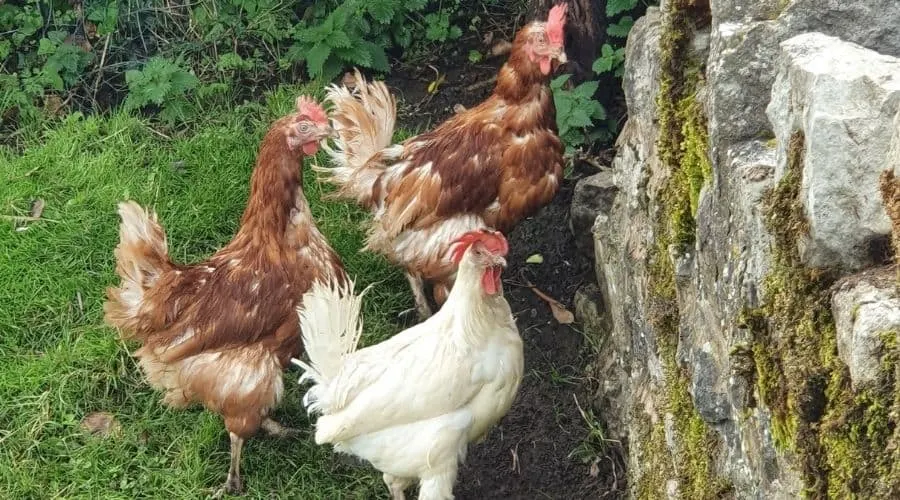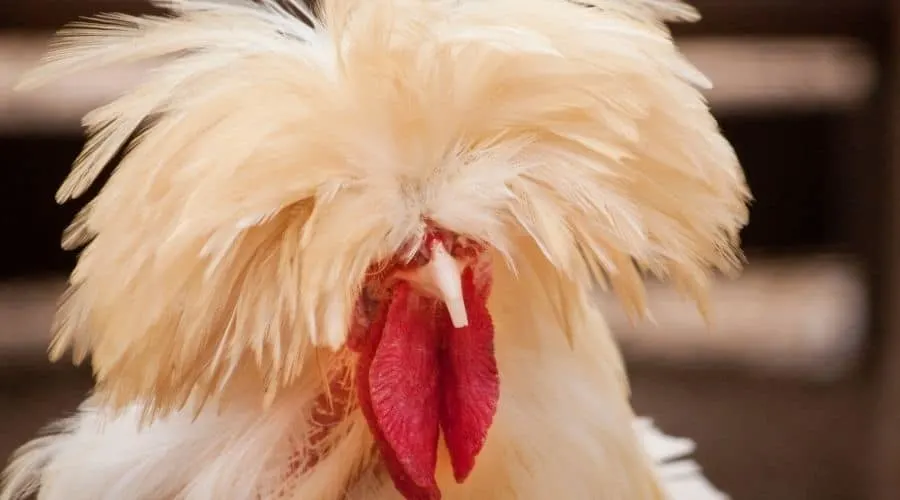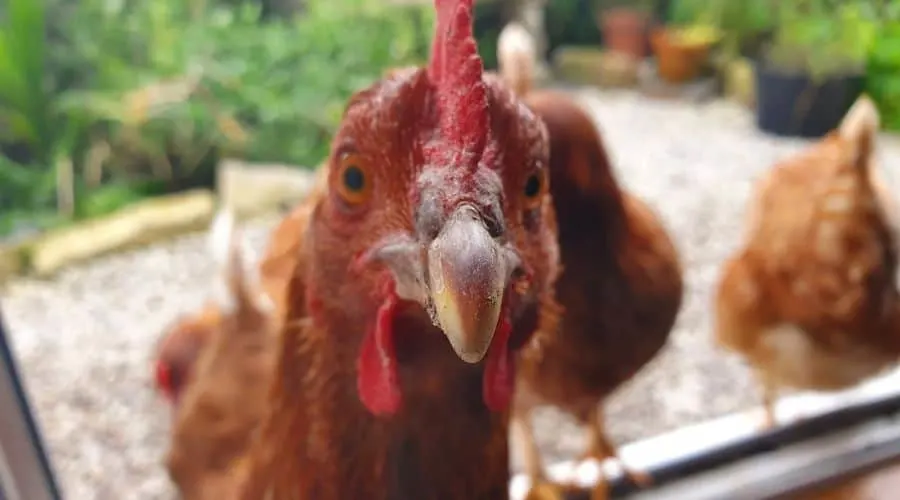Chickens are pretty easy to keep, but they do come with some challenges which are good to know before you start out. As chicken owners, we’ve had to learn some of these things the hard way, so I wanted to share all the pros and cons of keeping chickens to help you decide if it’s right for you.
So let’s get straight into the pros and cons of keeping chickens in your backyard or garden:
| Pros of keeping chicken | Cons of keeping chickens |
| Delicious and healthy eggs on a regular basis | Chickens can become victim to predators such as foxes, weasels and mink. |
| You can create a happy environment for chickens wich caged hens will never get | Chickens can be messy and can destroy flower beds |
| Each chicken has a unique and quirky personality | Roosters can be noisy and can upset neighbours |
| Keeping chickens is a great hobby | Chickens and chicken manure harbour bacteria which can make you ill |
| Chickens are much more intelligent than you think | You need to let your chickens out of the coop every morning & close up the coop at dusk every evening |
| Chickens make good educational pets for children | If you go on holiday you’ll need to ask someone to take care of your chickens |
| Chickens are relatively cheap to keep once you’re set up | Chickens may go for periods of time where they don’t lay eggs |
| There are many breeds to choose from | Chickens are good at escaping if they’re fenced in |
| Taking care of chickens can be good for mental health | They can get into fights and pecking can cause injury |
| It’s possible to keep chickens in a small backyard or garden | Chickens can be prone to disease and may require some medical help |
| Free-range chickens can forage for natural food which is full of good nutrients | It’s common to get red mites in a chicken coop and these can be difficult to get rid of |
| Areas, where chickens are kept, can attract pests such as flies and rats |
Now we’ve covered the list, read on to find out more detail about each pro and con listed in the table above to help you decide if keeping chickens is right for you.
The Pros of Keeping Chickens
Keeping chickens offers numerous benefits: free-range chickens lay flavorful, nutritious eggs; it provides a fulfilling life for chickens, unlike caged environments; they have unique personalities and intelligence; they’re educational for children; relatively low maintenance costs; a variety of breeds to choose from; and positive effects on mental health. Chickens can be kept in small spaces, and foraging for natural food makes them happier and improves egg quality.
Free-range chickens lay the best eggs
Chickens which are kept in a happy and healthy environment where they are fed with quality food and can forage for bugs, seeds and greens will produce good quality eggs which are full of flavour and have a rich yolk.
You just don’t get this with supermarket eggs because in most cases the chickens are kept in poor conditions and are not exposed to the things which make them the happiest.
You have the chance to give chickens a good life
Chickens which are kept in cages at chicken farms are laying machines which don’t have space to roam, don’t get to forage and are exposed to unnatural light to increase laying hours.
By keeping chickens for eggs and allowing them space to roam and forage naturally you’re receiving your eggs from much happier chickens.
Below is an image of some ex-battery hens which we adopted so they could spend their retirement years living a happier life. This is the first time they’d been let out onto the grass and they’ve loved every minute of it since.
As you can see they’re in a bit of a sorry state, they had hardly any feathers on their backends at first and one was very sore from sitting, they also had pale faces and crops because they’d never seen sunlight.

Chickens have big personalities
When I first started keeping chickens I couldn’t believe how much personality they had and over the years I’ve had some great chicken friends some of which have spent more time with me than other chickens.
Like people, each chicken has its own unique personality and quirkiness, and you can never predict how they will behave when you first get them.
Chickens are actually quite intelligent
It’s a common misconception that chickens are a bit stupid and in some respect, they are in that they don’t have a lot of common sense going on. After all, they’ve got pretty tiny brains when you compare them with the size of their bodies.
But chickens are more intelligent than people give them credit for and are especially good at hatching escape plans to get them into places they’re not supposed to go.
Chickens make good educational pets for children
Chickens are a really good educational pet for children, they’re interesting and best of all they produce eggs which kids love to go and collect.
Hens are often quite happy scratching around while kids are playing and a friendly chicken will even follow them around, especially if they’re given the odd treat.
Chickens are relatively cheap to keep
Although the initial set up of a coop, run, feeding bowls, bedding etc. can set you back a bit, once you have everything you need the general upkeep for chickens is pretty low.
What you spend on food and bedding you should make back in egg savings (depending on how many chickens you have and how many eggs you get through).
A 20kg sack of chicken pellets will last for a good six weeks for 6-8 chickens and you can buy bales of straw from local farms at a cheap price.
There are many breeds of chickens to chose from
There are many breeds of chicken that you can choose from to start with or add to your flock. Before choosing a chicken breed do some investigating to find out more about what you can expect from that breed, including:
- Personality and temperament – how friendly a chicken is can depend from breed to breed.
- Flightiness – some breeds are more flighty and easily spooked than others. This is something to consider if you’re looking to keep chickens in an open space.
- Hardiness – some chicken breeds originally come from warm climates and may struggle in very cold conditions.
- General health – some breeds may be more prone to health issues and disease, its good to do some investigating into the breed before you get the chickens.
There are some good Facebook groups out there and many chicken owners who keep more unusual chicken breeds, its a good idea to ask a group about a specific bread to find out more about what you can expect.

Taking care of chickens is good for mental health
Taking care of an animal has been proven in many studies to be good for mental health and well being. As an anxiety sufferer, I think this is definitely true of chickens.
Chickens are very calming to watch, from the noises they make to the way they scratch around with no cares in the world.
They’re also pretty stress-free to care for and allow you to spend more time outside in the fresh air and away from the stresses in life.
You can keep chickens in a small garden or yard
You don’t have to have large areas of land to keep chickens, it’s possible to keep a few chickens with a small garden or back yard as long as they’ve got space to scratch around.
If you don’t have much space then it’s best to keep only a small number of chickens and to check how many chickens you can house in a smaller coop.
Keep in mind that the chickens will need a run space around the coop to they have space to do the things they naturally enjoy.
Chickens which are free range can forage for natural food
Chickens love to scratch around and forage for natural foods such as bugs, worms, slugs, seeds and greens. Allowing the chickens access to forage has the following benefits for the chicken, including:
- Foraging provides chickens with free food.
- The chickens will be eating more natural nutrients which are really good for their health and well being.
- Free-range foraging chickens produce rich and tasty eggs with strong shells.
- Foraging chickens are happier because they’re doing what they would naturally.
Chickens will happily forage in a small area, but be aware if you choose to let them free in your garden they can destroy flower beds and kick up soil over paths etc.
The Cons of Keeping Chickens
Cons of keeping chickens include vulnerability to predators like foxes and rats, requiring secure coops and fencing for protection. Roosters can be noisy, which might not be suitable for urban areas. Chickens can carry bacteria like campylobacter, necessitating thorough hand washing. Daily commitment to open/close coop doors is also needed for their safety.
Chickens can be victim to predators
Chickens can be victims to predators and some will go to any length to catch one. Predators in the UK include foxes, mink, stoats, large birds of prey and even rats if they’re desperate.
Small chicks and very young chickens are particularly at risk from predators because they’re smaller and can be taken by a wider range of predators and they’re less aware of their surroundings.
Being ready for predators can prevent you from having any issues, these preventative measures include:
- Making sure the chicken coop is closed up once the chickens come in to roost at dusk.
- Predators can get through the smallest of holes or cracks, keeping up with coop repairs is vital for keeping them out.
- Having high fences around the coop – foxes can jump high, so having high fences around the coop area can be a good deterrent.

Roosters are noisy
Roosters are fun to keep, they’re a good way to control the pecking order and they’re really pretty to look at, but this can come at a cost.
It’s really down to personal preference whether you keep a rooster or not, but it’s something worth considering properly as many roosters end up going for re-homing.
As they come of age roosters start to get noisy and will generally crow early in the morning when the sun rises.
While some love the sound of a cockerel, this doesn’t always go down well with neighbours who are trying to have a lie-in on a Sunday morning after a hard week at work.
If you live in the country and have plenty of space around you or have other neighbours with Roosters then this might not be so much of a problem.
If you’re in an urban or built-up area then a rooster may not be such a good idea, unless you have understanding neighbours which you can speak with first.
Chickens harbour bacteria
I used to own a chicken who was like my best friend, she wasn’t interested in being with chickens and used to wait for me at the door and follow me everywhere when I went out. It got to the stage that she’d sit with me outside and lie next to me sunbathing.
When she was with me she always let me stroke her and she lapped it up, but one day it ended up in disaster (for me anyway!).
To cut a long story short I became pretty ill for a good few weeks and it turned out to be a bacteria called campylobacter, which is also a type of food poisoning and is commonly found on chickens. I realised I’d contracted it through my time spent with my friendly chicken.
So the point is, be aware that bacteria which chickens carry can make you very ill and this goes for chicken muck too.
Thorough hand washing after handling chickens, eggs and jobs around the coop is really important to keep any nasty bugs at bay.
Chickens need to be let in and out of the coop
Unless you’re lucky enough to have a self-closing/opening coop door, the coop door will need to be opened early each morning and once dusk comes and chickens are in to roost.
In the morning once the sun has risen, the chickens will be ready to come out to have something to eat and drink.
In the evening it’s important to close the coop once the chickens go into roost to prevent predators such as foxes getting into the coop.
You might find the following post on this topic useful:
7 ways to get chickens back into the coop at night
You will need holiday cover
If you plan to keep chickens, it’s a good idea to make sure that you have someone close by who can keep an eye on your chickens, along with being able to feed them, provide them with fresh water and to let them in and out of the coop.
These tasks will need doing on a daily basis so it can be a commitment for a friend or family member if you plan to go away for a few weeks.
Chickens don’t always lay eggs
Before you keep chickens for eggs it’s important to know that they don’t always lay eggs and they can go off they lay for various reasons.
In this situation, you will be feeding chickens with no return on the egg front. Many chicken owners are not too bothered about this and view eggs as a bonus, but if you plan to rely on eggs it’s important to know there will be times which are egg-free. Things which can impact egg production are:
- The breed – some chicken breeds produce higher egg yields than others.
- Young age – chickens won’t start laying eggs until around 18 weeks, but it can take longer (20-22 weeks) depending on the chicken.
- Old age – as chickens become older it’s common for them to lay less than a younger chicken would.
- chickens moult (lose feathers) – around once a year and around this time it’s common for them to go off the lay completely or for them to lay less than normal.
- Weather – in the winter months and when it’s very cold chickens may stop laying or slow down on egg production.
- Pests – pests such as red mites in a chicken coop or a visiting rat can cause stress and make chickens go off the lay.
Chickens are good at escaping
Chickens can be really good escape artists and will go to any length to get out of a coop, garden or back yard.
This isn’t always because they don’t like where they are, they can just get it into their heads that the other side of the fence is much more exciting than the side they should be on.
We recently raised four young Warrens who spent all day every day trying to get into our back garden and our neighbours back garden, even though they had unlimited common land to graze on.
We were convinced they were working together because they got into places and over high fences and we had no clue how they were doing it. Thankfully they came out of the naughty teenager stage and calmed down when they started laying, but there are some things you can do in this situation:
- Clip their wings – Clipping the ends of the wings will stop them fling higher, it sounds cruel but it’s painless and will help to stop them flying into pushes etc.
- Let them out of the coop area to roam and graze (if possible)- this will give them some freedom and stop them trying to escape.
- Make sure coops are kept clean, comfortable and pest-free – to make them more appealing.

Chickens can get into fights
In some cases, a pecking order can develop within a flock of chickens, where certain chickens will begin to peck and bully the others, especially where food is involved.
This can sometimes become a problem as the pecking and plucking at feathers can cause injury and sores.
When introducing chickens to an established flock can sometimes be tricky if a chicken or chickens take a dislike to the new birds and they may need to be separated for sometime before they can become properly introduced.
If you’re new to keeping chickens and all the birds are coming in at the same problem, you shouldn’t experience any issues, to begin with especially if they’re young.
In our experience of keeping chickens, they generally get on well together and fighting is pretty uncommon, but this can vary in breeds and whether you have a rooster in the flock.
Chickens can be prone to disease
Like any animal, chickens can contract diseases and illnesses which can make them sick and can be difficult to diagnose and treat.
It can also be difficult to find a vet who will treat chickens, especially in urban areas. Chickens have much less chance of contracting illnesses if they’re vaccinated and protected from disease at an early age.
Before you get your chickens make sure they have been fully vaccinated and that they’re coming from a reputable supplier.
Red mites in chicken coops
Red mites in chicken coops can be a serious issue because they can make the chickens very distressed and they can be difficult to get rid of once you get them.
The mites will crawl over all parts of the chicken and feed off them while they roost, the mites can be seen living int with the naked eye within the coop or underneath roof felt.
When they’ve not been feeding the mites are grey because they take on their red colour from the blood of the chickens.
You can buy chemicals and powders to kill mites, but they’re not always 100% effective and in some cases, the infestation gets so bad a blow torch is the only way to get rid of them.
Chickens can attract pests
Chicken coops and run areas can attract pest such as flies and rats who are looking to feed.
Rats like chicken food and will easily get into food sacks or will come and clear up any food left at the end of the day.
This article was first published on October 7, 2020 by Pentagon-Pets.
We always take away any uneaten food and we store food in a metal bin with a brick on top so they can’t get int.
You will also notice flies in and around the chicken coop in summer as they like to lay eggs in the manure. Regular cleaning out and replacement bedding should reduce the number of flies, but they are difficult to get rid of completely.
Until next time…
I hope this post has helped you to find out more about the pros and cons of chicken keeping before you consider if it’s right for you.
You might find it helpful to see some of our other beginner guides via the link below:
Keeping Chickens Warm in Winter and During Cold Weather
Pentagon Pet is the owner of this article that was first published on October 7, 2020.
Complete guide to keeping and caring for ex-battery hens
What not to feed chickens – the ultimate guide
Can chickens eat bread or should it be avoided?
Keeping Chickens Safe Around Water
Our recommended coop
Chicken coop for different flock sizes and different weather.
This article and its contents are owned by Pentagon Pets and was first published on October 7, 2020.

